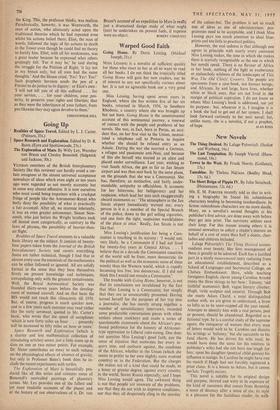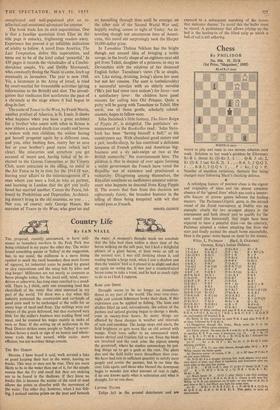New Novels
The Thing Desired. By Lalage Pulvertaft. (Secker and Warburg, 16s.) Tower in the West. By Frank Norris. (Gollancz, 15s.) The Short Reign of Pippin IV. By John Steinbeck. (Heinemann, 12s. 6d.) MR. E. M. FORSTER recently told us that in writ- ing a biography he found his subordinate characters tending to becoming insubordinate. In fiction subordinate chiiracters are no more docile. Many, on a novelist's second thoughts at his publisher's first advice, are done away with before they get into print. The survivors seldom earn their keep. For this reason among others it is unusual nowadays to solicit a reader's interest on behalf of a cast of more than half a dozen, char- ladies and children included.
Lalage Pulvertaft's The Thing Desired accom- modates over twenty. Her firm management of them is greatly to be admired. Each has a justified part in a nicely mouvemente story radiating from an educational establishment, described as a School of Languages and Secretarial College, on Chelsea Embankment. Here, while teaching foreigners English, clever young Caroline Arnold resins the three strings to her bow : Tommy, 'old faithful' economist; Bob, vague literary climber; Hugh, virile sculptor and amorist. Through Bob she meets Adam Chard, a most distinguished author with, we are given to understand, a brow so lofty as to be snow-capped all the year round. Attempts to identify him with a real person, past or present, should be abandoned. Regarded as a fictional type, he is a careful study of the supreme egoist, the conqueror of women that every man of letters would wish to be. Caroline can dismiss his writings as 'boloney,' but she succumbs to his fatal charm. He has driven his wife mad; he would have done the same for his mistress (a publisher's wife) had she not been too tough for him; upon his daughter (poetical child-genius) his influence is malign. In Caroline he might have met his match if Hugh had not forcibly registered a prior claim. It is a lesson to Adam, but it comes too late. Tragedy occurs.
This novel is notable for its original design and purpose, shrewd and witty in its exposure of the kind of messiness that comes from throwing a sense of decency after a sense of sin; its style is a pleasure for the fastidious reader, its well- complicated and well-populated plot an in- tellectual and emotional adventure for anyone.
The book trade has its own superstitions. One is that a familiar quotation from Eliot on the title page is unlucky, frightening readers away. Experience has proved it an infallible indication of aridity to follow. A novel from America, The Last Temptation, defies this superstition, and turns out to be of the kind called 'powerful.' In 430 pages it records the vicissitudes of a Czecho- slovakian couple, Vic and Debby Marmorek, who, constantly fleeing the Nazis to come, fetch up eventually in Jerusalem. The year is now 1948. Vic, a lieutenant in the Army of Israel, is tried by court-martial for treasonable activities (giving information to the British) and shot. The investi- gation that vindicates him accelerates the pace of a chronicle at the stage where it had begun to drag its feet.
The scene of Tower in the West, by Frank Norris, another product of Atinerica, is St. Louis. It shows what happens when you have a great architect for a brother who meets with what in fiction is now althost a natural death (car crash) and leaves a widow with two children, the widow having got herself pregnant again by a different man, and you, after bashing him, marry her to save her or your brother's good name (which isn't clear). She miscarries and somehow you get accused of incest and, having failed to be re- elected to the Greens Committee at the 'County Club, scent ostracism in the offing, so enlist in the Air Force to be in time for the 1914-18 war, leaving your affairi to the misinanagement of a man whom you were a fool ,to take as partner, and learning in London that the girl you 'really loved has married another. Comes the Peace, fol- lowed by Prohibition and Depression. Architect- ing doesn't bring in the old mazuma, so you . . . Not you, of course; only George Hanes, the narrator of Tower in the West, who goes on and
on tunnelling through time until he emerges on the other side of ' the Second World War and, happily ending,' comes in sight of Today. An in- teresting though not uncommon item of Ameri- cana, this novel not surprisingly took the Harper 10,000-dollar prize.
In Tamahine Thelma. Niklaus has the bright though not unused idea of bringing a noble savage, in the lovely shape of an eighteen-year-old girl from Tahiti, daughter of a princess, to stay in Devonshire with the relatives of her deceased English father. Tamahine's views ('Is so simple, sex. Like eating, drinking, living') alarm her aunt but not her cousins. The aunt is (unbelievably) a successful novelist with an elderly novelist (He's just had some rave notices') for lover—not a satisfactory lover : the children have good reasons for calling him Old Priapus. Quite a party will be going with Tamahine to Tahiti. Her uncle, one of those gentle, scholarly school- masters, hopes to follow soon.
John Steinbeck's little fantasy, The Short Reign of Pippin IV, is delightful. The publishers' an- nouncement in the Bookseller read : 'John Stein- beck has been "having himself a ball," as his countrymen say. With abundant good nature and a pen, needle-sharp, he has contrived a delicious lampoon of French politics and American big- business and a sly side-swipe or two at the British monarchy.' No overstatement here. The p'efsition is that in despair of ever again forming a stable government the French have voted the Republic out of existence and proclaimed a mcitiarchy. Disagreeing among themselves, the Royalists nominate an inoffensive amateur astron- omer who happens to descend from King Pippin 11. The events that flow from this decision are rapturously funny, the broadest humour in the telling of them being tempered with wit that would pass as French.
DANIEL GEORGE











































 Previous page
Previous page